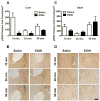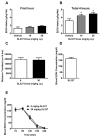Alcohol alters the activation of ERK1/2, a functional regulator of binge alcohol drinking in adult C57BL/6J mice
- PMID: 25703719
- PMCID: PMC4348173
- DOI: 10.1111/acer.12645
Alcohol alters the activation of ERK1/2, a functional regulator of binge alcohol drinking in adult C57BL/6J mice
Abstract
Background: Binge alcohol drinking is a particularly risky pattern of alcohol consumption that often precedes alcohol dependence and addiction. The transition from binge alcohol drinking to alcohol addiction likely involves mechanisms of synaptic plasticity and learning in the brain. The mitogen-activated protein kinase (MAPK) signaling cascades have been shown to be involved in learning and memory, as well as the response to drugs of abuse, but their role in binge alcohol drinking remains unclear. The present experiments were designed to determine the effects of acute alcohol on extracellular signaling-related kinases (ERK1/2) expression and activity and to determine whether ERK1/2 activity functionally regulates binge-like alcohol drinking.
Methods: Adult male C57BL/6J mice were injected with ethanol (EtOH) (3.0 mg/kg, intraperitoneally) 10, 30, or 90 minutes prior to brain tissue collection. Next, mice that were brought to freely consume unsweetened EtOH in a binge-like access procedure were pretreated with the MEK1/2 inhibitor SL327 or the p38 MAPK inhibitor SB239063.
Results: Acute EtOH increased pERK1/2 immunoreactivity relative to vehicle in brain regions known to be involved in drug reward and addiction, including the central amygdala and prefrontal cortex. However, EtOH decreased pERK1/2 immunoreactivity relative to vehicle in the nucleus accumbens core. SB239063 pretreatment significantly decreased EtOH consumption only at doses that also produced nonspecific locomotor effects. SL327 pretreatment significantly increased EtOH, but not sucrose, consumption without inducing generalized locomotor effects.
Conclusions: These findings indicate that ERK1/2 MAPK signaling regulates binge-like alcohol drinking. As alcohol increased pERK1/2 immunoreactivity relative to vehicle in brain regions known to regulate drug self-administration, SL327 may have blocked this direct pharmacological effect of alcohol and thereby inhibited the termination of binge-like drinking.
Keywords: Alcohol; Amygdala; Binge Drinking; ERK1/2; MAP Kinase; Nucleus Accumbens.
Copyright © 2015 by the Research Society on Alcoholism.
Figures






References
-
- ALEGRIA AA, HASIN DS, NUNES EV, LIU SM, DAVIES C, GRANT BF, BLANCO C. Comorbidity of generalized anxiety disorder and substance use disorders: results from the National Epidemiologic Survey on Alcohol and Related Conditions. The Journal of clinical psychiatry. 2010;71:1187–95. quiz 1252-3. - PMC - PubMed
-
- AROOR AR, SHUKLA SD. MAP kinase signaling in diverse effects of ethanol. Life sciences. 2004;74:2339–64. - PubMed
-
- BACHTELL RK, TSIVKOVSKAIA NO, RYABININ AE. Alcohol-induced c-Fos expression in the Edinger-Westphal nucleus: pharmacological and signal transduction mechanisms. The Journal of pharmacology and experimental therapeutics. 2002;302:516–24. - PubMed
Publication types
MeSH terms
Substances
Grants and funding
LinkOut - more resources
Full Text Sources
Other Literature Sources
Research Materials
Miscellaneous

